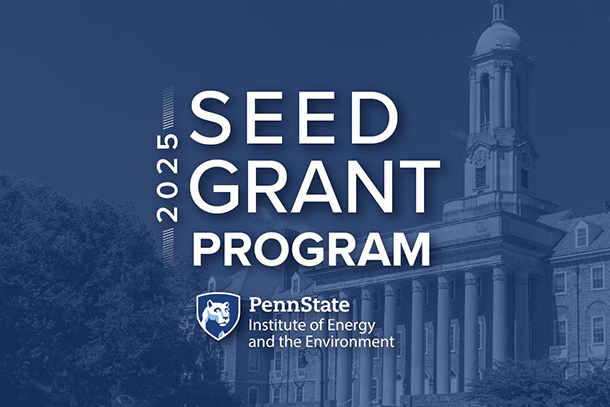
More than 30 researchers from seven Penn State colleges received seed funding from the Institute of Energy and the Environment to advance innovative, early-stage work addressing critical energy and environmental challenges. Credit: Brenna Buck.
Five College of Engineering research teams awarded IEE seed grants
June 24, 2025
Editor’s Note: This article originally appeared on Penn State News.
UNIVERSITY PARK, Pa. — Ten interdisciplinary research teams, including five teams that include researchers from the College of Engineering, have received funding through the Institute of Energy and the Environment’s (IEE) 2025 Seed Grant Program. The program supports basic and applied research that lays the groundwork to pursue external funding and is guided by IEE’s five research themes. This year, the program awarded seed funding to 34 Penn State researchers across seven colleges and 17 departments and units.
The five projects that were awarded seed grants that involve College of Engineering-affiliated researchers include:
- “Biomanufacturing Platform to Integrate Dairy Wastes into Circular Bioeconomy” looks to develop a sustainable biomanufacturing platform to transform dairy processing waste into biofuels, renewable chemicals and sustainable foods, supporting a more circular food and energy system.
- Rui Shi, Department of Chemical Engineering in the College of Engineering; Yi Zhang, College of Agricultural Sciences; Joshua Lambert, College of Agricultural Sciences
- “Conductive Polymer + Au/TiO2 Composites for Energy Storage” will design and develop new polymer materials that can safely store and release hydrogen gas, which could help create better, cleaner energy systems in the future.
- Bert Chandler, Department of Chemical Engineering in the College of Engineering; Elizabeth Elacqua, Eberly College of Science
- “Dry Electrolysis for Recycling CO2 to Renewable Hydrocarbon Fuels and Chemicals” will investigate how applying electric fields to carbon materials can make carbon dioxide conversion more energy-efficient, creating a sustainable source of fuel components for cleaner energy systems.
- Margaret Kowalik, Department of Mechanical Engineering in the College of Engineering; Adri van Duin, Department of Nuclear Engineering in the College of Engineering; Randy Vander Wal, College of Earth and Mineral Sciences
- “Low-Cost Smart Energy-Efficient Windows Using Temperature-Sensitive Shape-Memory Polymers” seeks to develop a smart window that automatically responds to outside temperatures using a special heat-responsive polymer, reducing energy use in buildings.
- Patrick Mather, Department of Chemical Engineering in the College of Engineering; Nathan Keim, Eberly College of Science; Julian Wang, College of Arts and Architecture; Sebanti Chattopadhyay, Eberly College of Science
- “Resilient Transmission Planning Under Extreme Event Uncertainty” looks to develop new tools to help make the electric grid more reliable by identifying rare but serious events, such as extreme weather or sudden power surges, so planners can better prepare for them.
- Anirudh Subramanyam, Department of Industrial and Manufacturing Engineering in the College of Engineering; Mort Webster, College of Earth and Mineral Sciences
For more than 10 years, IEE has provided critical funding for researchers to develop new interdisciplinary research teams and position them for high-impact research and substantial external funding success. Since 2016, the IEE Seed Grant Program has resulted in more than $100 million in external funding from government agencies, non-profit organizations and industry, a 19:1 return on investment.
More than funding, the IEE Seed Grant Program cultivates a collaborative learning environment. It fosters teamwork and leadership by bringing together senior and junior faculty, postdoctoral researchers and graduate students. Through these projects, participants gain valuable mentorship and expertise, ultimately developing into well-rounded researchers poised to lead future interdisciplinary teams.
The Institute of Energy and the Environment connects and supports interdisciplinary teams of researchers that are solving some of the world’s most difficult energy and environmental challenges. For more information about the seed grant program or the Institute of Energy and the Environment, visit iee.psu.edu.

